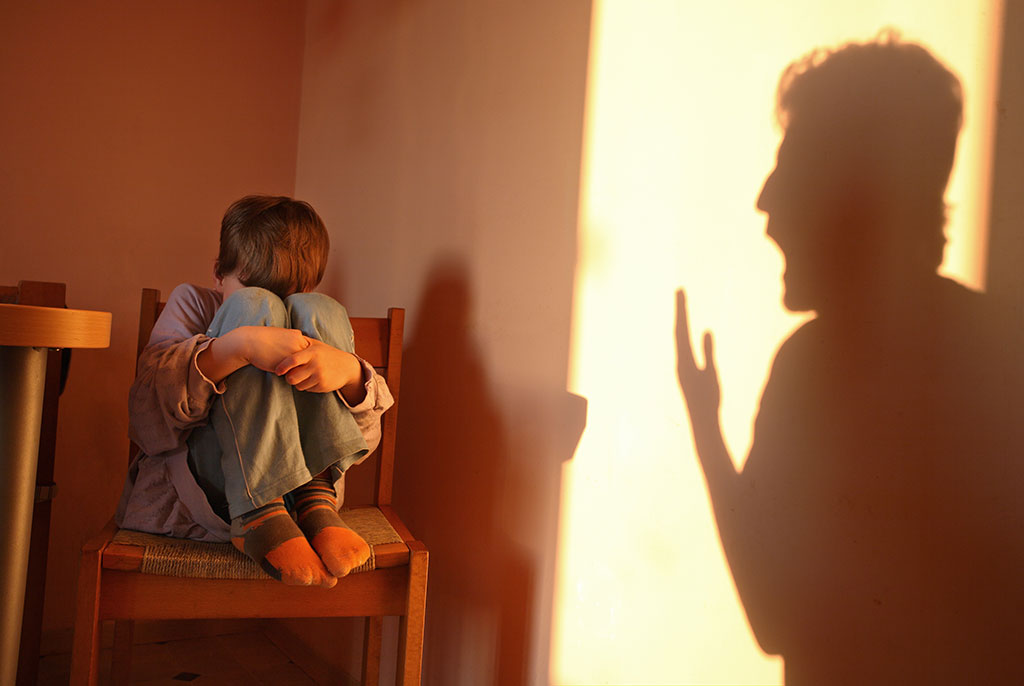There’s a good chance that you (a) were yelled at by your parents as a child (b) have yelled at your own children, or (c) all of the above.
As humans, yelling is in our wiring. It’s an evolutionary alarm system for when seconds count to preserve life and limb.
When it comes to our children, yelling surely has its place. When our kid starts chasing the ball into the street, raising our voice can be very effective. “But when it comes to correcting behavior or compelling children to do something… maybe not so much,” says UConn Health assistant professor of psychiatry Damion Grasso.

What if the reason we raise our voice with our children has more do with releasing our own frustration than it does with constructively influencing how our kids behave?
What if, rather than being a tool for teaching our kids how to make good choices, yelling fuels our desire as parents to feel like we’re in control?
Could we be unintentionally conveying the message that we in fact are not in control?
Are we actually preventing our kids from making good choices on their own because they’re just waiting for our next reaction to decide what to do?
Increasingly, parental experts are emphasizing the concept that yelling at our kids causes more problems than we intend for it to solve.
“Yelling, screaming, and threatening children to get them to start or stop a behavior is ineffective and increases risk that children will develop emotional or behavioral problems,” Grasso says. “And children in homes where parents regularly raise their voices tend to have lower self-esteem and higher rates of depression.”
Grasso and colleague Margaret Briggs-Gowan have found that verbal forms of harsh parenting partially explain the relationship between children’s exposure to parental conflict and mental health problems. Currently they are studying the association between harsh parenting and children’s exposure to interpersonal violence and how children respond to threatening stimuli.
“Exposure to chronic and severe harsh parenting, especially behaviors that cross the line into what we might consider emotional abuse, such as calling a child ‘dumb or lazy,’ saying they’re no good, or threatening to send them away, is associated with more serious mental health problems in children that include depression, anxiety, and disruptive behavior disorders, Grasso says.
There are alternatives to yelling as a correction tool, often requiring some planning ahead.
For example, here’s one approach for getting your child to put away her coat and backpack after school:
- Clearly – and calmly – establish in advance what your expectation is. Maybe at the breakfast table it’s something like “I’d love it if you could help me out today and make sure the front hallway is straightened up by the time I get home tonight.” You’re giving her an opportunity – and the time – to choose to succeed.
- Make sure you (and your spouse) are hanging up your coat(s) as soon as you walk in the door, and make sure your child can see the satisfaction you take from doing your part to keep the front hallway tidy. When parents model the desired behavior, it tends to reinforce the behavior.
- If you get home and her coat is hung up and her backpack is put away, be sure to happily acknowledge it and praise her – positive reinforcement!
- If she’s scrambling to hang up her coat right as you’re walking in the door, take the victory and happily say something like, “Thank you for taking care of that. The hallway looks great!”
- If you still have to step over her coat and backpack when you get home, it’s time for choices. (First, you have to choose whether you’ll give in to the temptation to raise your voice in reaction to this insubordination!) You can – calmly – offer something like, “Are you going to take care this, like we discussed, now? Or, would you like to do it later and I’ll hang on your iPad until Sunday?”
“It’s that last part, preparing reasonable consequences, that requires planning ahead, and it’s far more effective when both parents discuss and agree on it in advance, maintain a united front, and remain consistent, calm, and in control,” Grasso says.
The idea is to create an environment in which our kids’ behavior is shaped by praise, modeling, and a sense of accomplishment, rather than anger and drama that can lead to fear, resentment, and a cycle of fraying nerves.
Learn more about child and adolescent psychiatry services at UConn Health and the
UConn Health Psychological Trauma Clinic.



